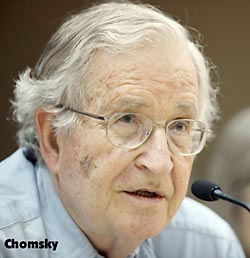By Richard Hall
 Look back at Noam Chomsky’s lectures over the years and you will notice a recurring title: “The current crisis in the Middle East.” The reason for this, Chomsky says, is because often he is asked to give titles for speaking engagements years in advance, and it is a title that is always relevant.
Look back at Noam Chomsky’s lectures over the years and you will notice a recurring title: “The current crisis in the Middle East.” The reason for this, Chomsky says, is because often he is asked to give titles for speaking engagements years in advance, and it is a title that is always relevant.
On a visit to Beirut as part of a regional tour, the world-renowned linguist, scholar and political analyst talks about the most recent crisis facing the region, and how the United States and Israel are alone in blocking a two-state solution to the Israel-Palestine conflict.
“It’s a joke of course, but it does work,” he laughs, in reference to his lecture titles. The current and most pressing crisis in the Middle East right now, according to Chomsky, is Iran, “and the US is working very hard to ensure that there is a crisis” he says.
“It was quite interesting to see how they reacted to the Iranian nuclear agreement brokered by Turkey and Brazil. They were terrified because someone else was intervening; they displaced the US as the primary agent in the region.”
The agreement to which Chomsky refers calls for Tehran to ship around half its stock of low-enriched uranium to Turkey and months later receive a supply of more highly enriched uranium suitable for research and medical use. The problem was not the agreement itself, Chomsky argues, but that the US was excluded.
Chomsky proposes that the United States is actively encouraging a crisis with Iran with the goal of quelling its growing influence in the region. “The real winner in the Iraq war was Iran. The US destroyed Iran’s main enemy in Iraq and left it the major regional power.” The United States’ primary concern over the Iranian nuclear program, he continues, is over its deterrence capability. “No one in their right mind thinks Iran would use a nuclear weapon, it would be suicide, but to have it would deter the United States from aggression,” he says, adding that the resolution being pursued by the United States would be unlikely to have an effect on Iranian nuclear capabilities.
As part of his tour of the region, Chomsky had planned to speak at Bir Zeit University near the West Bank city of Ramallah, but was denied entry to the West Bank at the Israeli-controlled crossing from Jordan. Israel’s interior ministry insisted the incident was a “misunderstanding” and said the 81-year-old professor had not been blacklisted, while a senior government source described the situation as “a total cockup.”
“It was a cowardly excuse on the part of Israel” says Chomsky, “I heard a series of excuses and they finally hit on the one that I expected, in fact the person they blamed it on was the official on the border. But this was false; he was in constant contact with the ministry of interior during the whole interrogation, relaying queries and instructions.”
On proximity talks between Israel and the Palestinians recently re-launched by US envoy George Mitchell, Chomsky says he has little hope.
“The fact of the matter is that it is the wrong people negotiating, it should be the United States and the world. Because what in fact has been happening for 34 years, and is happening now, is that there is an overwhelming international consensus on the general terms of a diplomatic resolution and the US is blocking it. On the ground Israel is blocking it, but Israel can’t do anything without US authorization, so it is in fact the US who is blocking it.”
This trip will be Chomsky’s second visit to the country, the first being just weeks before the Israeli attack in 2006. “Unfortunately it has changed substantially,” he said of the differences between now and then. Chomsky used part of his time in Lebanon to visit villages in the south that were devastated during the Israeli attack and met with Hezbollah official Nabeel Kaouk.
On the possibility of another Israeli attack on Lebanon, Chomsky says Israel “would have to be crazy to do so.”
“They are kind of irrational at this point and hard to predict. If they do it, it would be part of an attack on Iran. If they are planning to attack Iran they would have to simultaneously attack Lebanon, just to get rid of the deterrent, and they wouldn’t do it in advance because they would lose the element of surprise.”

Leave a Reply
You must be logged in to post a comment.